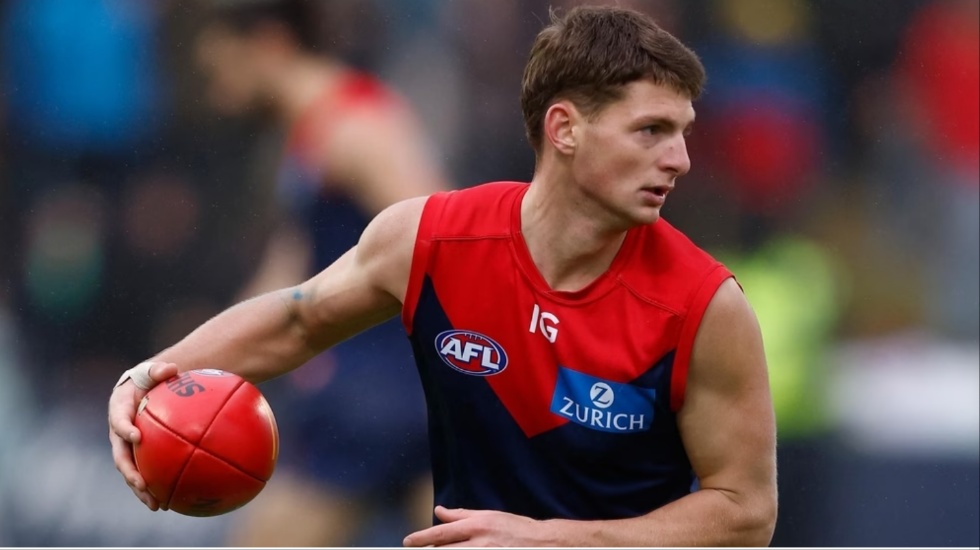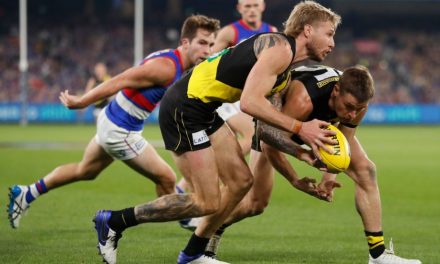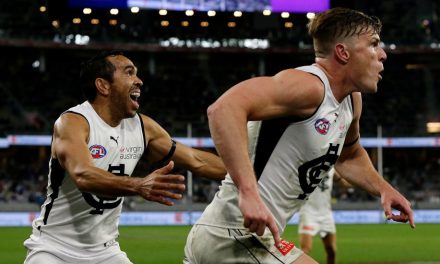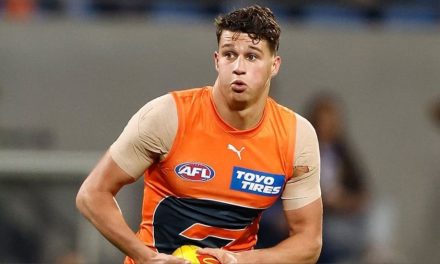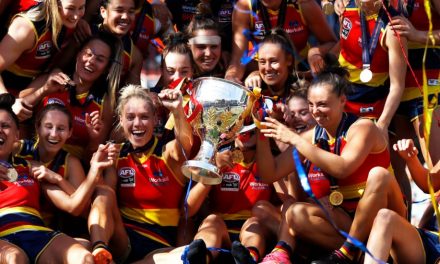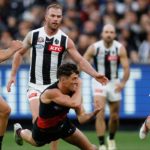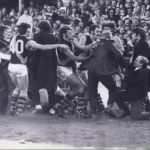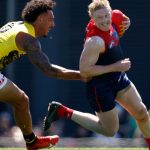Melbourne has no shortage of superstars, and Judd McVee (pictured) showed last year he might add his name to that list sooner rather than later. Photo: AFL MEDIA
MELBOURNE
2023 record: 16 wins, 9 losses (6th)
THE INS
Jack Billings (St Kilda), Shane McAdam (Adelaide), Tom Fullarton (Brisbane), Caleb Windsor (Eastern Ranges), Koltyn Tholstrup (Subiaco), Kynan Brown (Oakleigh Chargers), Marty Hore (Williamstown)
THE OUTS
Brodie Grundy (Sydney), Michael Hibberd (retired), James Harmes (Western Bulldogs), James Jordon (Sydney), Luke Dunstan (retired), Deakyn Smith (delisted), Kye Turner (delisted)
THE STRENGTHS
Melbourne is very fortunate in that it still has a huge core of superstars that will enable it to have at least one more crack at a premiership this year. Max Gawn is still arguably the best ruckman in the land, Clayton Oliver and Christian Petracca are two of the very best midfielders in the AFL, and as Steven May showed during his destruction of dual Coleman Medallist Charlie Curnow in last year’s semi-final, he is still an elite defender. And on the next rung down, the Demons still boast the likes of Jack Viney, Angus Brayshaw, Bayley Fritsch, Ed Langdon and Kysaiah Pickett. That is a lot of talent to work with and gives coach Simon Goodwin a solid framework from which to launch another charge at a flag. May spearheads a brilliant defence which was ranked No.2 in the competition last year. With Brayshaw, Harrison Petty, Jake Lever, Trent Rivers, Jake Bowey, 2023 surprise packet Judd McVee and Christian Salem all rotating through that part of the ground, Melbourne’s opponents will find it hard to score again in 2024. But they are given huge chop-out by their star-studded midfield. With generational talents Gawn, Oliver and Petracca all in the same on-ball division, as well as Viney, life is made that bit easier for the Demons’ backline. Petracca was ranked second and third for contested possessions and disposals respectively in the AFL last year, and equal seventh for clearances, all while kicking a near-career-high 28 goals. With strong support from Viney, Gawn, Oliver and Brayshaw, Petracca propelled the Demons to second spot in the league for contested possessions and fifth for clearances. Gawn and May were the main reason why the Dees ranked fifth for contested marks in 2023. Melbourne also had the sixth-best attack last year with six players kicking at least 20 goals, including Fritsch (38) and Pickett (37).
PLEASE HELP US CONTINUE TO THRIVE BY BECOMING AN OFFICIAL FOOTYOLOGY PATRON. JUST CLICK THIS LINK.
THE WEAKNESSES
But all of those positives will serve as cold comfort for Melbourne fans who witnessed their club suffer back-to-back straight-sets exits from the finals last year. If losing to Collingwood in the qualifying final by seven points, despite having a staggering 32 more forward entries, wasn’t galling enough, the Demons got done by Carlton the following week in the semi-final by two points after booting 9.17, including 2.6 in a catastrophic final quarter, to wrench defeat from the jaws of victory. Thanks largely to the efforts of Petracca and Viney, Melbourne was second for inside-50s last year and third for marks inside 50 with Fritsch, Pickett, van Rooyen and that man again Petracca (when he drifted forward) all presenting strongly in attack. For all of that hard work and those opportunities they generated, the Demons should’ve been in the top couple of offences, rather than No.6, and pushing for another premiership. But their infamous forward dysfunction came back to bite them again. Melbourne suffered six of its nine losses last year when they had more than/the same amount of scoring shots as its opponents. The Demons also registered more inside 50s than the opposition in four of their defeats. Compounding things for Melbourne is the fact that one of the men who played a big role in turning its fortunes around up forward late last season, Jake Melksham, did his ACL in Round 24 and will be sidelined for most of this year. And with Joel Smith facing a potential two-year drug ban, Melbourne will likely be deprived of yet another attacking option this season. Smith kicked three of the Demons’ nine goals in last year’s semi-final and given how shockingly inaccurate they were on that night, the fact he didn’t kick a behind further highlighted how valuable he can be to the side. While Melbourne will be hoping the acquisitions of Jack Billings and Shane McAdam will help fix their forward woes, they’ll be more concerned about Tom McDonald and Harrison Petty staying fit and healthy this season after they missed 17 and 11 games respectively last year. After playing mostly as a defender since debuting in 2018, Petty kicked six of his 19 career goals against Richmond in Round 20 last year, before injuring himself the following week just as it looked like the emergence of a new dangerous forward weapon had emerged. The dramatic drop-off from Ben Brown hasn’t helped matters either for the Demons. Meanwhile, so much of Melbourne’s hopes rely on Gawn remaining injury-free that one could argue if the champion 32-year-old goes down for an extended period, he will almost certainly take his team’s premiership chances with him. That makes the Demons look quite vulnerable, for all the star power they possess. In an ideal world, they would’ve convinced Brodie Grundy to stick around, because he would be just about the best back-up ruck in the league. But unlike other teams, Melbourne doesn’t like using two rucks, and Grundy wasn’t going to spend all season waiting in the VFL for his next chance. So after the much-hyped Gawn-Grundy experiment ended disastrously, Grundy took himself, and the remaining four years of his contract, and headed up to the Swans. That means if Gawn is injured, a lot will rest on the shoulders of Tom Fullarton, after just 19 games in five years with the Lions, and none last season. Almost as important for Melbourne as Gawn’s health is Oliver finding some off-field stability. The champion on-baller has attracted numerous unwanted headlines over the pre-season, sparking widespread concerns for his wellbeing. If Melbourne wants to have another crack at a flag this year, it simply must to do everything it can to ensure the three-time All-Australian has the strongest support network possible surrounding him.
ONE TO WATCH
McVee came from the clouds last year to play every game for the Demons and cement his place in the backline. After being taken in the 2022 rookie draft, and failing to play a game in 2022, the 20-year-old showed last season that he has all the makings of a classic rookie-draft bargain by the time his career ends.
UNDER THE PUMP
Unless something miraculous happens, it would be surprising to see Ben Brown on Melbourne’s list by the end of the season. The premiership forward has experienced a spectacular fall from grace, with poor form and injury conspiring against the former Kangaroo. He was dropped in Round 20 last year and didn’t return to the senior team. He is a shadow of the man that booted at least 60 goals in three consecutive years for North.
BEST 22
B: Jake Bowey, Steven May, Harrison Petty
HB: Angus Brayshaw, Jake Lever, Trent Rivers
C: Lachie Hunter, Clayton Oliver, Ed Langdon
HF: Kade Chandler, Jacob van Rooyen, Alex Neal-Bullen
F: Bayley Fritsch, Tom McDonald, Kysaiah Pickett
R: Max Gawn, Christian Petracca, Jack Viney
Inter: Tom Sparrow, Judd McVee, Christian Salem, Charlie Spargo
Emerg: Adam Tomlinson, Shane McAdam, Jack Billings, Tom Fullarton
Melksham would’ve been a walk-up start to the side, and Smith probably would’ve been as well, but for reasons already mentioned, the pair are out of the team. Petty is in the backline for now, but don’t be surprised at all if Goodwin throws him back up forward again. Poor form and injuries have restricted Billings to just 11 games in the past two seasons at the Saints, while McAdam only managed seven matches last year with Adelaide. The pair will see some game time, but will be made to earn it given they’re competing for spots with Pickett, Alex Neal-Bullen, Kade Chandler and Charlie Spargo.
*all team stat rankings mentioned are based on differentials, not totals (apart from overall offence and defence).

